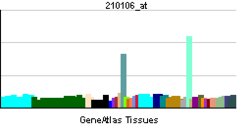RDH5
11-cis retinol dehydrogenase is an enzyme that in humans is encoded by the RDH5 gene.[3][4][5][6]
References
- ↑ "Human PubMed Reference:".
- ↑ "Mouse PubMed Reference:".
- ↑ Mertz JR, Shang E, Piantedosi R, Wei S, Wolgemuth DJ, Blaner WS (Jun 1997). "Identification and characterization of a stereospecific human enzyme that catalyzes 9-cis-retinol oxidation. A possible role in 9-cis-retinoic acid formation". J Biol Chem. 272 (18): 11744–9. doi:10.1074/jbc.272.18.11744. PMID 9115228.
- ↑ Simon A, Lagercrantz J, Bajalica-Lagercrantz S, Eriksson U (Feb 1997). "Primary structure of human 11-cis retinol dehydrogenase and organization and chromosomal localization of the corresponding gene". Genomics. 36 (3): 424–30. doi:10.1006/geno.1996.0487. PMID 8884265.
- ↑ Persson B, Kallberg Y, Bray JE, Bruford E, Dellaporta SL, Favia AD, Duarte RG, Jornvall H, Kavanagh KL, Kedishvili N, Kisiela M, Maser E, Mindnich R, Orchard S, Penning TM, Thornton JM, Adamski J, Oppermann U (Feb 2009). "The SDR (Short-Chain Dehydrogenase/Reductase and Related Enzymes) Nomenclature Initiative". Chem Biol Interact. 178 (1–3): 94–8. doi:10.1016/j.cbi.2008.10.040. PMC 2896744
 . PMID 19027726.
. PMID 19027726. - ↑ "Entrez Gene: RDH5 retinol dehydrogenase 5 (11-cis/9-cis)".
Further reading
- Simon A, Hellman U, Wernstedt C, Eriksson U (1995). "The retinal pigment epithelial-specific 11-cis retinol dehydrogenase belongs to the family of short chain alcohol dehydrogenases". J. Biol. Chem. 270 (3): 1107–12. doi:10.1074/jbc.270.3.1107. PMID 7836368.
- Bonaldo MF, Lennon G, Soares MB (1997). "Normalization and subtraction: two approaches to facilitate gene discovery". Genome Res. 6 (9): 791–806. doi:10.1101/gr.6.9.791. PMID 8889548.
- Wang J, Chai X, Eriksson U, Napoli JL (1999). "Activity of human 11-cis-retinol dehydrogenase (Rdh5) with steroids and retinoids and expression of its mRNA in extra-ocular human tissue". Biochem. J. 338 (Pt 1): 23–7. doi:10.1042/0264-6021:3380023. PMC 1220019
 . PMID 9931293.
. PMID 9931293.
- Yamamoto H, Simon A, Eriksson U, et al. (1999). "Mutations in the gene encoding 11-cis retinol dehydrogenase cause delayed dark adaptation and fundus albipunctatus". Nat. Genet. 22 (2): 188–91. doi:10.1038/9707. PMID 10369264.
- Gonzalez-Fernandez F, Kurz D, Bao Y, et al. (2000). "11-cis retinol dehydrogenase mutations as a major cause of the congenital night-blindness disorder known as fundus albipunctatus". Mol. Vis. 5: 41. PMID 10617778.
- Nakamura M, Hotta Y, Tanikawa A, et al. (2000). "A high association with cone dystrophy in Fundus albipunctatus caused by mutations of the RDH5 gene". Invest. Ophthalmol. Vis. Sci. 41 (12): 3925–32. PMID 11053295.
- Kuroiwa S, Kikuchi T, Yoshimura N (2000). "A novel compound heterozygous mutation in the RDH5 gene in a patient with fundus albipunctatus". Am. J. Ophthalmol. 130 (5): 672–5. doi:10.1016/S0002-9394(00)00765-0. PMID 11078852.
- Chen P, Lee TD, Fong HK (2001). "Interaction of 11-cis-retinol dehydrogenase with the chromophore of retinal g protein-coupled receptor opsin". J. Biol. Chem. 276 (24): 21098–104. doi:10.1074/jbc.M010441200. PMID 11274198.
- Driessen CA, Janssen BP, Winkens HJ, et al. (2001). "Null mutation in the human 11-cis retinol dehydrogenase gene associated with fundus albipunctatus". Ophthalmology. 108 (8): 1479–84. doi:10.1016/S0161-6420(01)00640-6. PMID 11470705.
- Nakamura M, Miyake Y (2002). "Macular dystrophy in a 9-year-old boy with fundus albipunctatus". Am. J. Ophthalmol. 133 (2): 278–80. doi:10.1016/S0002-9394(01)01304-6. PMID 11812441.
- Haeseleer F, Jang GF, Imanishi Y, et al. (2003). "Dual-substrate Specificity Short Chain Retinol Dehydrogenases from the Vertebrate Retina". J. Biol. Chem. 277 (47): 45537–46. doi:10.1074/jbc.M208882200. PMC 1435693
 . PMID 12226107.
. PMID 12226107.
- Strausberg RL, Feingold EA, Grouse LH, et al. (2003). "Generation and initial analysis of more than 15,000 full-length human and mouse cDNA sequences". Proc. Natl. Acad. Sci. U.S.A. 99 (26): 16899–903. doi:10.1073/pnas.242603899. PMC 139241
 . PMID 12477932.
. PMID 12477932.
- Wu Z, Yang Y, Shaw N, et al. (2003). "Mapping the ligand binding pocket in the cellular retinaldehyde binding protein". J. Biol. Chem. 278 (14): 12390–6. doi:10.1074/jbc.M212775200. PMID 12536149.
- Hotta K, Nakamura M, Kondo M, et al. (2003). "Macular dystrophy in a Japanese family with fundus albipunctatus". Am. J. Ophthalmol. 135 (6): 917–9. doi:10.1016/S0002-9394(02)02290-0. PMID 12788147.
- Sekiya K, Nakazawa M, Ohguro H, et al. (2003). "Long-term fundus changes due to Fundus albipunctatus associated with mutations in the RDH5 gene". Arch. Ophthalmol. 121 (7): 1057–9. doi:10.1001/archopht.121.7.1057-b. PMID 12860821.
- Nakamura M, Skalet J, Miyake Y (2003). "RDH5 gene mutations and electroretinogram in fundus albipunctatus with or without macular dystrophy: RDH5 mutations and ERG in fundus albipunctatus". Documenta ophthalmologica. Advances in ophthalmology. 107 (1): 3–11. doi:10.1023/A:1024498826904. PMID 12906118.
- Yamamoto H, Yakushijin K, Kusuhara S, et al. (2003). "A novel RDH5 gene mutation in a patient with fundus albipunctatus presenting with macular atrophy and fading white dots". Am. J. Ophthalmol. 136 (3): 572–4. doi:10.1016/S0002-9394(03)00332-5. PMID 12967826.
- Sato M, Oshika T, Kaji Y, Nose H (2004). "A novel homozygous Gly107Arg mutation in the RDH5 gene in a Japanese patient with fundus albipunctatus with sectorial retinitis pigmentosa". Ophthalmic Res. 36 (1): 43–50. doi:10.1159/000076109. PMID 15007239.

 . PMID 19027726.
. PMID 19027726. . PMID 9931293.
. PMID 9931293. . PMID 12226107.
. PMID 12226107. . PMID 12477932.
. PMID 12477932.